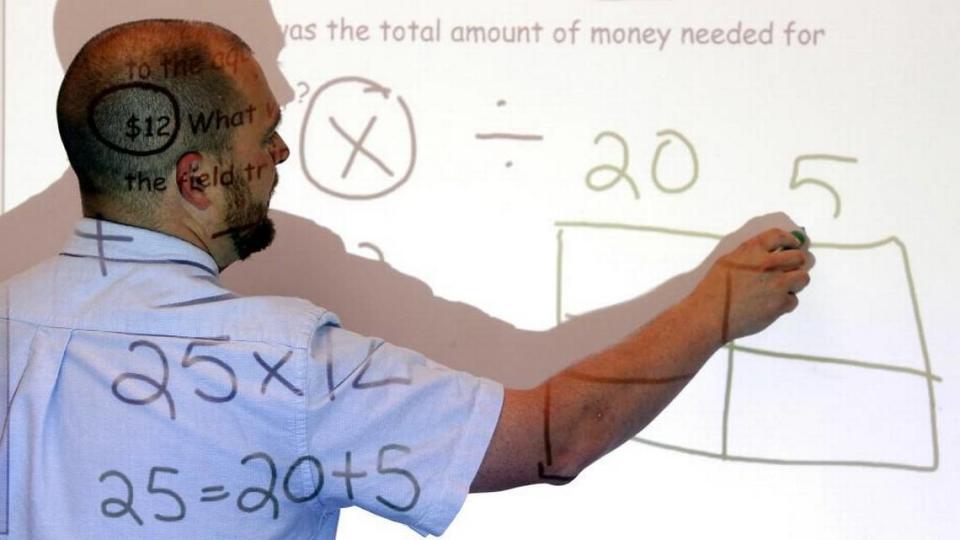Remember being a kid during the Olympics?
How we staged our own games.
How we’d compete for neighborhood dominance of doing the most wheelies.
How we never had a closing ceremony because arguments erupted, cheating alleged — and someone yelled ‘MOMMEEEEEEE!!!!!”
Ah, good times. And perhaps proof it’s not totally politicians at fault for the divisive debates that define the election process.
Best part of the Olympics? How all of us — lounging on the sofa, munching chips and wearing ugly baggy shorts — have become instant experts on the one-tenth deduction.
We know how to point out the one-tenth deduction when Simone does the Biles II on the vault (which EVERYONE knows is a Yurchenko double-pike).
But can you write what one-tenth looks like numerically?
As mathletes, we’re a nation that won’t make the podium.
Anyone who has paid cash at a store has gone through the silent agony of a clerk trying to count out change.
Many restaurants have gone to screen payments or printed receipts with tip amounts by percentage so they don’t have to watch us do math.
Low math skills
In the U.S., about a third of adults have low numeracy skills (which is the ability to make calculations and interpret statistics). That equates to about 62 million adults with low math skills. Put another way, that’s the population of North Carolina multiplied by six.
The headline for this November 2023 story from The News & Observer’s T. Keung Hui caught my attention: “Change is coming in how math is taught in NC schools. But will it make students care?” “Math is for everyone,” said Deputy State Superintendent Michael Maher in Keung’s report. “It’s not just for certain people. It’s not just for kids going to college.”
Not only are test scores struggling, students are rationalizing to educators (and parents) that they are not “a math person.”
Pause, please.
It’s OK to NOT be a “kale person.” There is no one-tenth deduction in life for preferring other veggies.
The same for NOT being a “reality TV person,” “sports person,” “politics person” or even a “barbecue person” (although we can’t be friends).
But anyone who has to show up for an interview, apply for a mortgage or read the expiration date on a carton of milk has to be a math person.

The reason former President Donald Trump and current Vice President Kamala Harris keep showing up in North Carolina is all about the math.
If you’re among the 70 percent of U.S. adults who are numerically literate — those who use and understand math as day-to-day — let’s rally to make math great again.
About 99.9 percent of this column’s readers are, shall we say, seasoned like Old Bay. You have children and probably grandchildren and maybe grand-grandchildren. The conversations you have can influence how younger generations think of math and its contextual connection with everyday decisions.
Go through nearly any story in The N&O and there’s often a math lesson that affects you. We report on property tax rates for your community, whether state workers will see pay raises in the budget and even the price of eggs at local grocery stores.
Math is everywhere
Math often is the evidence in accountability journalism. Korie Dean’s recent story on UNC-Chapel Hill requiring active-shooter training for faculty continues to raise public questions on why it took so long to reach this decision — four years after an internal audit recommendation and one year after an on-campus shooting death of a professor.
And math doesn’t have to be serious stuff. Sometimes a story turns into an opportunity to tease your neighbor.
When Steve Wiseman reported that Duke’s 95-year-old Wallace Wade Stadium will have a party deck this season, the math screamed with tongue-in-cheekers.
Is the new Devils Deck with its all-you-can-eat buffet meant to improve Duke’s ranking among NC colleges as a party school? First in academics, first in athletics … but third in party-hardiness? (They must be working late at Duke Admissions to overcome No. 1 East Carolina, aka the Stanford of Eastern NC.)
And what if Joey Chestnut shows up for the UNC game? Chestnut is a Hall of Famer who consumed 76 hot dogs in 10 minutes at the 2021 Nathan’s Famous International Hot Dog Eating Contest. Chestnut could knock out 1,368 hot dogs during a three-hour game. At $5 a hot dog, he’d take Duke for $6,840 versus the $47-$57 ticket add-on for the Devil Deck buffet spread. (They must be working late in the Fuqua School of Business to figure out the Joey equation.)
If you’re still reading this, I thank you. No one-tenth deduction for you.
You get it.
Editor preaches to choir.
Declares readin’, ‘ritin’ and ‘rithmetic to be important.
Bill Church is executive editor of The News & Observer.
EMEA Tribune is not involved in this news article, it is taken from our partners and or from the News Agencies. Copyright and Credit go to the News Agencies, email news@emeatribune.com Follow our WhatsApp verified Channel





